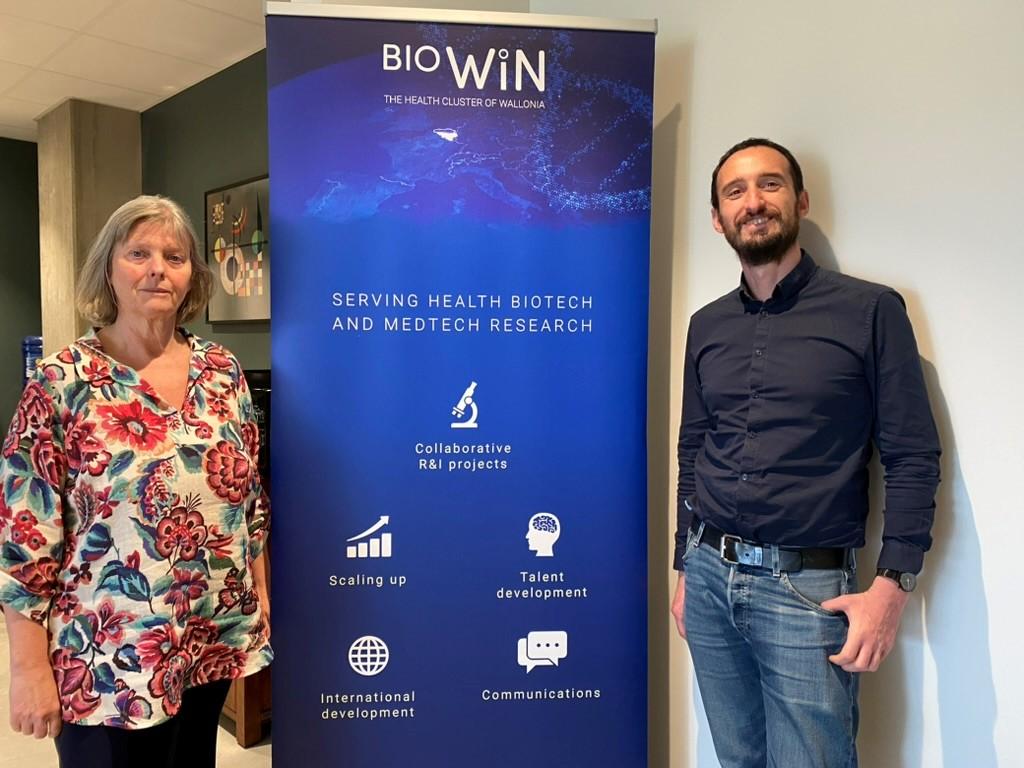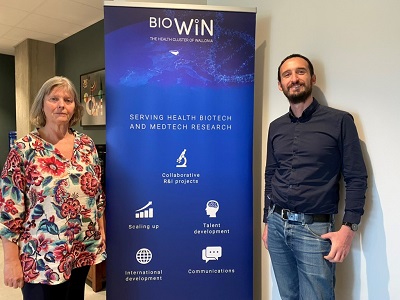HPC at the Service of Health Biotech, Medtech Research and Innovation

EuroCC Belgium met Marianne Ghyoot, Director of Research & Innovation at Biowin, the Health Cluster of Wallonia, Belgium.
Biowin is the leading player in the field of health biotech and medtech research and innovation projects. The cluster brings together Walloon players involved in all stages of research, development and production of innovative products, processes, and services.
[EuroCC Belgium] How do you think HPC can support research, development, and production of innovative products?
 We find that data is an important component of innovation in most of the research projects we support, whether in medtech or biotech. To manage large amounts of data, you need powerful tools to process and analyze it. In this context, high-performance computing infrastructures can be useful for processing and analyzing large amounts of data and the complex interactions involved.
We find that data is an important component of innovation in most of the research projects we support, whether in medtech or biotech. To manage large amounts of data, you need powerful tools to process and analyze it. In this context, high-performance computing infrastructures can be useful for processing and analyzing large amounts of data and the complex interactions involved.
The same applies to biomanufacturing, where the current trend is to use data to optimize processes. One example is the NEMO project. This project aims to support the development of these bio-processes through digital technologies: it aims to combine empirical models, which feed on measured data, with mechanistic models, based on fundamental scientific principles, in order to represent a digital twin of the whole manufacturing process and optimize it. [1]
Whether in R&D or biomanufacturing, the use of HPC is proving to be relevant, even if the potential of HPC is not yet sufficiently promoted or present in cluster projects.
[EuroCC Belgium] The use of health data combined with technology (AI / high performance computing) contributes to improved health and precision medicine. Can you tell us more?
The advent of precision medicine involves the use of individual biological omics data (genomics, proteomics, metabolomics) for diagnosis, medical treatment, and prevention. As an example, I would like to mention the "GLORIA" project, recently funded by the Walloon Region, and led by a consortium of companies, university laboratories and a network of patients. The genetic analyses carried out will be able to provide information on a person's predisposition to developing a disease and, as a result, enable them to adapt their lifestyle. On a more collective level, DNA databases could be used for research to develop new screening tools, new risk factors and new treatments.
GLORIA PROJECT Today, the emergence of genetic tests and falling costs make it possible to inform anyone about their propensity to develop a pathology, as well as the means of reducing the probability of its occurrence (primary prevention), its extent (secondary prevention) and the most effective treatments. However, a growing number of genetic tests are ordered directly over the Internet, and studies show an increase in tests carried out by Europeans on platforms located outside Europe. The quality of these online tests is questionable, and without a secure framework, there is a real risk that parallel and recreational medicine will develop, without the supervision of health professionals. The project called “GLORIA – Global Rapid and Innovative DNA Analysis” emerged from collaborations between healthcare experts who share the vision to develop patient-centered solutions for the benefit of personalized medicine. Their mutual ambition is to create the first European platform to provide citizens with a secure vault in which to store their digital DNA, enabling analyses to be carried out using computer-based risk profiling tools for complex common diseases and certain rare diseases [2]. |
The acquisition and analysis of multimodal patient data, i.e. biological data (DNA, RNA, proteome, and metabolome), exposomic data (environmental factors to which the patient has been exposed), clinical data and imaging data, is essential if we are to move towards precision and personalized medicine. To support this type of approach and to be able to process large amounts of data, the use of HPC seems to me to be essential, even if the conclusions of the algorithms resulting from the research still need to be validated by specially trained healthcare professionals! This is the approach taken by the Learning Coalitions, one of the research priorities of the Walloon MedReSyst initiative, which brings together 5 French-speaking universities, 2 research centers and several hospitals.
[EuroCC Belgium] The Walloon Region is one of the world's leading centers for research, development and industrial production of vaccines and biological products. Do you think that the provision of HPC infrastructure (and related services) can contribute to the competitiveness of the biopharmaceutical industry in Belgium?
Competitiveness depends on innovation, R&D, and production. As we have just seen, data and the optimization of data management play a crucial role at all three levels. So HPC certainly has a role to play in maintaining Wallonia's competitiveness in the fields of vaccines and nuclear medicine, to name but two of Wallonia's areas of excellence.

From left to right: Marianne Ghyoot, Director Research & Innovation at BIOWIN, Benoît Dompierre, Head of Belgian National Competence Center on HPC/HPDA/AI, EuroCC Belgium
[1] https://biowin.org/fr/2022/07/06/nemo-2/
[2] Source ©️ Biowin https://biowin.org/fr/2023/10/05/gloria-2/
Published 02/07/2024